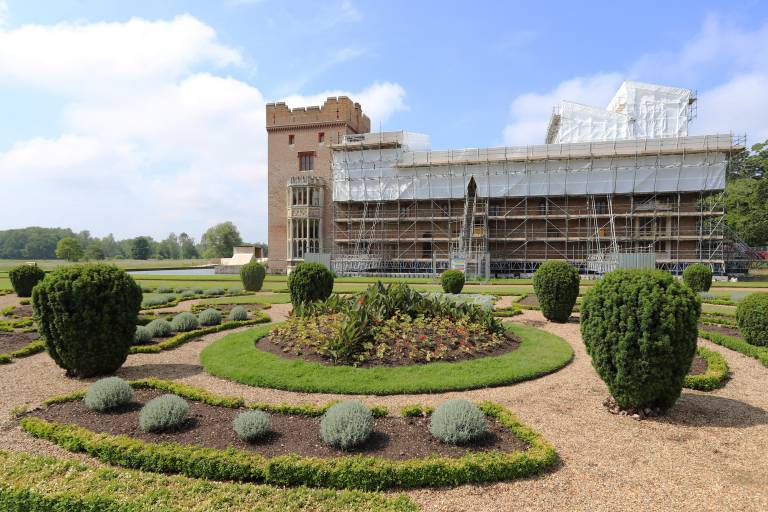UCL’s partnership with the National Trust: update and how to get involved
14 February 2022
Since May 2021, UCL and the National Trust have been working more closely than ever on heritage conservation research.

The five-year strategic agreement between UCL and the National Trust, one of the first of its kind of this scale, is a fundamental step forward for the heritage sector.
The partnership is opening up exciting opportunities for researchers from both organisations to:
- explore new ways of working
- inform policy
- demonstrate how university-industry collaborations can provide lasting benefits for local communities, and our national and global heritage
Multidisciplinary knowledge-exchange programme
The first stage, a multidisciplinary knowledge-exchange programme, is now well underway, with four secondments taking place in the latter half of 2021. UCL researchers spent three months working with colleagues in the Trust on four areas of mutual interest, aligned to the Trust’s strategic objective, ‘Looking after what we’ve got’.
Determining and maximising the benefits of historic environments for the community and individual health and wellbeing
A research team from UCL Biosciences was tasked with understanding the link between the built environment and people’s wellbeing. The findings are set to pave the way for new wellbeing approaches, including novel ways to use the Trust’s sites to support vulnerable people.
Secondee: Dr Rabya Mughal, Culture and Health Research, UCL Biosciences.
Evaluation of decarbonising the Let Estate
This project kickstarted a process to assess the energy performance of the 3,000 buildings the Trust rents to tenants. The work has shown that improvements to data structures and analysis could help the Trust meet its net zero policy.
Secondee: Dr Rob Liddiard, UCL Energy Institute.
Evaluation of participatory archaeology at the National Trust
UCL and National Trust researchers joined forces to evaluate how archaeology affects the wellbeing of volunteers. The tools that came out of the project will help the Trust and others to understand and improve the social impact of their work.
Secondee: Sarah Wolferstan, UCL Centre for Applied Archaeology.
The state of the art of carbon footprinting
Around 1% of the Trust’s largest construction projects are responsible for nearly 40% of the carbon emissions from their buildings. This project identified significant opportunities for tracking and reducing the carbon footprint of these projects.
Secondee: Dr Yair Schwartz, UCL Institute for Environmental Design and Engineering
The value of secondments
UCL’s Sarah Wolferstan explains that working in partnership with the National Trust has helped researchers at UCL gain valuable insight into policy issues.
“We saw the secondment as a means of helping us achieve our core mission; to bridge academic and commercial practice.
“It’s been a novel way of working for us, doing research in this collaborative way, but we gained enormously from it. As well as exploring how the sector translates policy into practice, the project has raised our profile as specialists on wellbeing evaluation.
“We’ve been asked to join a national working group on wellbeing and evaluation coordinated by the Council for British Archaeology. I’ll be incorporating this work into my guest lectures for the Institute of Archaeology’s Cultural Heritage MA, too.
“The short timeframe may put some academics off applying. So I’d encourage them to see these secondments and placements as an opportunity to create something entirely different to a traditional research output.
“If you’re part of a team with a wide remit, it will give you a valuable opportunity to work in partnership with the heritage sector.”
Get involved
For anyone interested in exploring opportunities with the National Trust, a series of policy placements are now being planned on:
- The cost effectiveness of fiscal incentives in increasing the repair and maintenance of heritage assets
- The contribution of the historic environment outdoors to physical and mental wellbeing
- The role of restoration skills in COVID-19 recovery
Beyond the launch initiatives, the collaboration will open the door to new opportunities for teaching and students at UCL, and large research projects.
If you’d like to discuss any aspect of the UCL/National Trust partnership, including the policy placements or other opportunities for collaborative research, please contact enterprise@ucl.ac.uk
Read more about how Sarah Wolferstan benefitted from being a National Trust research secondee.
Links
- UCL and the National Trust partner to promote heritage science, conservation and cultural value
- UCL academic spotlight: Professor Rodney Harrison on UCL’s new partnership with the National Trust
- UCL Centre for Applied Archaeology
- The Bartlett, UCL's Faculty of the Built Environment
- National Trust
Image
National Trust roof restoration project, Oxburgh Hall. Copyright Mike Shelby.
 Close
Close

